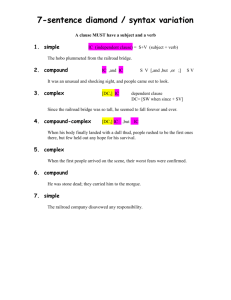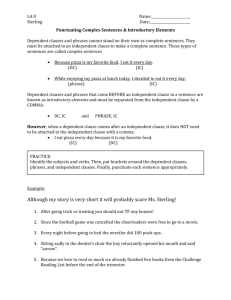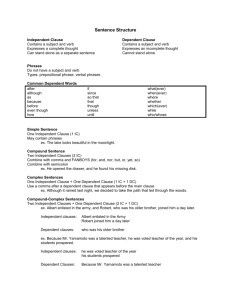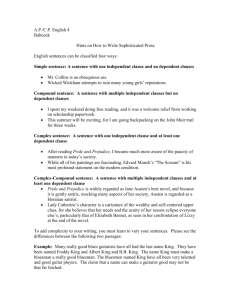Making Subjects and Verbs Agree: Exercise Answers
advertisement
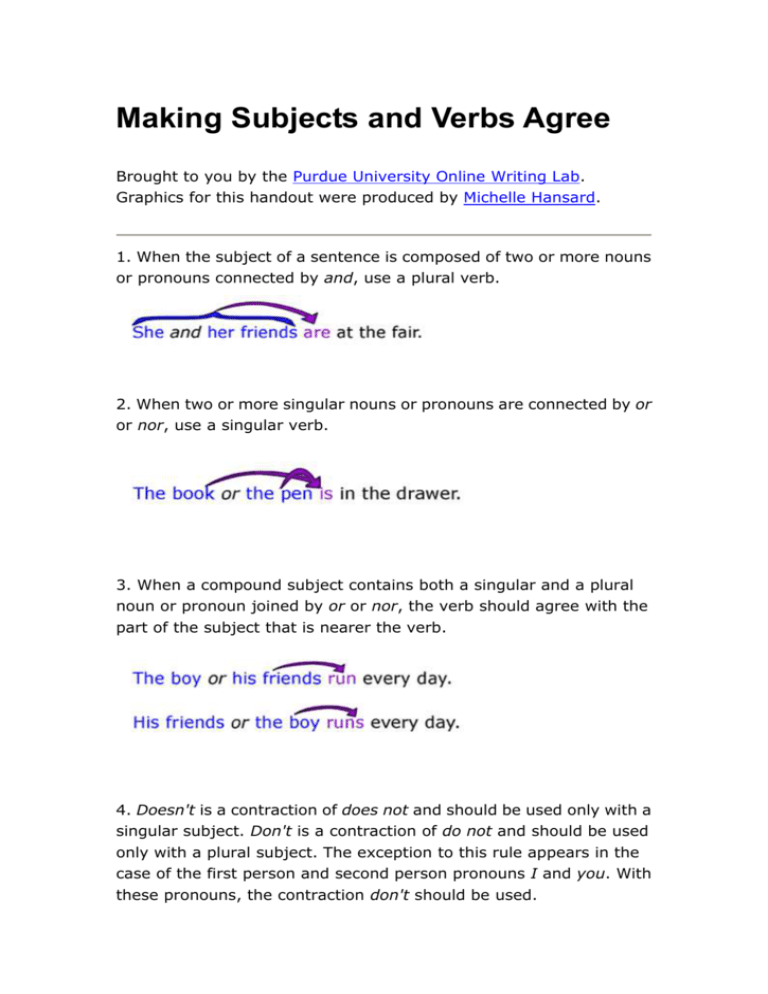
Making Subjects and Verbs Agree Brought to you by the Purdue University Online Writing Lab. Graphics for this handout were produced by Michelle Hansard. 1. When the subject of a sentence is composed of two or more nouns or pronouns connected by and, use a plural verb. 2. When two or more singular nouns or pronouns are connected by or or nor, use a singular verb. 3. When a compound subject contains both a singular and a plural noun or pronoun joined by or or nor, the verb should agree with the part of the subject that is nearer the verb. 4. Doesn't is a contraction of does not and should be used only with a singular subject. Don't is a contraction of do not and should be used only with a plural subject. The exception to this rule appears in the case of the first person and second person pronouns I and you. With these pronouns, the contraction don't should be used. 5. Do not be misled by a phrase that comes between the subject and the verb. The verb agrees with the subject, not with a noun or pronoun in the phrase. 6. The words each, each one, either, neither, everyone, everybody, anybody, anyone, nobody, somebody, someone, and no one are singular and require a singular verb. 7. Nouns such as civics, mathematics, dollars, measles, and news require singular verbs. Note: the word dollars is a special case. When talking about an amount of money, it requires a singular verb, but when referring to the dollars themselves, a plural verb is required. 8. Nouns such as scissors, tweezers, trousers, and shears require plural verbs. (There are two parts to these things.) 9. In sentences beginning with there is or there are, the subject follows the verb. Since there is not the subject, the verb agrees with what follows. 10. Collective nouns are words that imply more than one person but that are considered singular and take a singular verb, such as: group, team, committee, class, and family. In very few cases, the plural verb is used if the individuals in the group are thought of and specifically referred to. 11. Expressions such as with, together with, including, accompanied by, in addition to, or as well do not change the number of the subject. If the subject is singular, the verb is too. Making Subjects and Verbs Agree: Exercise Answers Brought to you by the Purdue University Online Writing Lab. Choose the correct form of the verb that agrees with the subject. 1. Annie and her brothers are at school. 2. Either my mother or my father is coming to the meeting. 3. The dog or the cats are outside. 4. Either my shoes or your coat is always on the floor. 5. George and Tamara don't want to see that movie. 6. Benito doesn't know the answer. 7. One of my sisters is going on a trip to France. 8. The man with all the birds lives on my street. 9. The movie, including all the previews, takes about two hours to watch. 10. The players, as well as the captain, want to win. 11. Either answer is acceptable. 12. Every one of those books is fiction. 13. Nobody knows the trouble I've seen. 14. Is the news on at five or six? 15. Mathematics is John's favorite subject, while Civics is Andrea's favorite subject. 16. Eight dollars is the price of a movie these days. 17. Are the tweezers in this drawer? 18. Your pants are at the cleaner's. 19. There were fifteen candies in that bag. Now there is only one left! 20. The committee debates these questions carefully. 21. The committee lead very different lives in private. 22. The Prime Minister, together with his wife, greets the press cordially. 23. All of the CDs, even the scratched one, are in this case. Independent and Dependent Clauses (Definitions) Brought to you by the Purdue University Online Writing Lab Definitions Independent Clause (IC) An independent clause is a group of words that contains a subject and verb and expresses a complete thought. An independent clause is a sentence. Example: Jim studied in the Sweet Shop for his chemistry quiz. (IC) Dependent Clause (DC) A dependent clause is a group of words that contains a subject and verb but does not express a complete thought. A dependent clause cannot be a sentence. Often a dependent clause is marked by a dependent marker word. Example: When Jim studied in the Sweet Shop for his chemistry quiz . . . (DC) (What happened when he studied? The thought is incomplete.) Dependent Marker Word (DM) A dependent marker word is a word added to the beginning of an independent clause that makes it into a dependent clause. Example: When Jim studied in the Sweet Shop for his chemistry quiz, it was very noisy. (DM) Some common dependent markers are: after, although, as, as if, because, before, even if, even though, if, in order to, since, though, unless, until, whatever, when, whenever, whether, and while. Connecting dependent and independent clauses There are two types of words that can be used as connectors at the beginning of an independent clause: coordinating conjunctions and independent marker words. 1. Coordinating Conjunction (CC) The seven coordinating conjunctions used as connecting words at the beginning of an independent clause are and, but, for, or, nor, so, and yet. When the second independent clause in a sentence begins with a coordinating conjunction, a comma is needed before the coordinating conjunction: Example: Jim studied in the Sweet Shop for his chemistry quiz, but it was hard to concentrate because of the noise. (CC) 2. Independent Marker Word (IM) An independent marker word is a connecting word used at the beginning of an independent clause. These words can always begin a sentence that can stand alone. When the second independent clause in a sentence has an independent marker word, a semicolon is needed before the independent marker word. Example: Jim studied in the Sweet Shop for his chemistry quiz; however, it was hard to concentrate because of the noise. (IM) Some common independent markers are: also, consequently, furthermore, however, moreover, nevertheless, and therefore. Proper Punctuation Methods This table gives some examples of ways to combine independent and dependent clauses and shows how to punctuate them properly. IC. IC. I went to the store. I didn't buy any bread. IC; IC. I went to the store; I didn't buy any bread. IC, CC IC. I went to the store, but I didn't buy any bread. IC; IM, I went to the store; however, I didn't buy any bread. IC. DC, IC. When I went to the store, I didn't buy any bread. IC DC. I didn't buy any bread when I went to the store. Some Common Errors to Avoid Comma Splices A comma splice is the use of a comma between two independent clauses. You can usually fix the error by changing the comma to a period and therefore making the two clauses into two separate sentences, by changing the comma to a semicolon, or by making one clause dependent by inserting a dependent marker word in front of it. Incorrect: I like this class, it is very interesting. Correct: I like this class. It is very interesting. (or) I like this class; it is very interesting. (or) I like this class, and it is very interesting. (or) I like this class because it is very interesting. (or) Because it is very interesting, I like this class. Fused Sentences Fused sentences happen when there are two independent clauses not separated by any form of punctuation. This error is also known as a run-on sentence. The error can sometimes be corrected by adding a period, semicolon, or colon to separate the two sentences. Incorrect: My professor is intelligent I've learned a lot from her. Correct: My professor is intelligent. I've learned a lot from her. (or) My professor is intelligent; I've learned a lot from her. (or) My professor is intelligent, and I've learned a lot from her. (or) My professor is intelligent; moreover, I've learned a lot from her. Sentence Fragments Sentence fragments happen by treating a dependent clause or other incomplete thought as a complete sentence. You can usually fix this error by combining it with another sentence to make a complete thought or by removing the dependent marker. Incorrect: Because I forgot the exam was today. Correct: Because I forgot the exam was today, I didn't study. (or) I forgot the exam was today. Sentence Fragments Brought to you by the Purdue University Online Writing Lab We also have more information about sentences and general writing concerns. Fragments are incomplete sentences. Usually, fragments are pieces of sentences that have become disconnected from the main clause. One of the easiest ways to correct them is to remove the period between the fragment and the main clause. Other kinds of punctuation may be needed for the newly combined sentence. Below are some examples with the fragments shown in red. Punctuation and/or words added to make corrections are highlighted in blue. Notice that the fragment is frequently a dependent clause or long phrase that follows the main clause. Fragment (phrase or dependent clause) Possible Revision Purdue offers many majors in engineering. Such as electrical, chemical, and industrial engineering. Purdue offers many majors in engineering, such as electrical, chemical, and industrial engineering. Coach Dietz exemplified this behavior by walking off Coach Dietz exemplified this the field in the middle of a game. Leaving her team at a time when we needed her. I need to find a new roommate. Because the behavior by walking off the field in the middle of a game, leaving her team at a time when we needed her. I need to find a new roommate because the one I one I have now isn't working out too well. have now isn't working out too well. The current city policy on housing is incomplete as it stands. Which is why we believe the proposed amendments should be passed. Because the current city policy on housing is incomplete as it stands, we believe the proposed ammendments should be passed. You may have noticed that newspaper and magazine journalists often use a dependent clause as a separate sentence when it follows clearly from the preceding main clause, as in the last example above. This is a conventional journalistic practice, often used for emphasis. For academic writing and other more formal writing situations, however, you should avoid such journalistic fragment sentences. Some fragments are not clearly pieces of sentences that have been left unattached to the main clause; they are written as main clauses but lack a subject or main verb. Fragment (incomplete main clause) No main verb A story with deep thoughts and emotions. Possible Revisions Appositive: Gilman's "The Yellow Wallpaper," a story with deep thoughts and emotions, has impressed critics for decades. Direct object: She told a story with deep thoughts and emotions. Toys of all kinds thrown everywhere. Complete verb: Toys of all kinds were thrown everywhere. Direct object: They found toys of all kinds thrown everywhere. A record of accomplishment beginning when you were first hired. Direct object: I've noticed a record of accomplishment beginning when you were first hired. Main verb: A record of accomplishment began when you were first hired. No subject With the ultimate effect of all advertising is to sell Remove preposition: The ultimate effect of all advertising is to sell the the product. product. By paying too much attention to polls can make a political leader unwilling to propose innovative policies. Remove preposition: Paying too much attention to polls can make a political leader unwilling to propose innovative policies. For doing freelance work for a competitor got Phil fired. Remove preposition: Doing freelance work for a competitor got Phil fired. Rearrange: Phil got fired for doing freelance work for a competitor. These last three examples of fragments with no subjects are also known as mixed constructions, that is, sentences constructed out of mixed parts. They start one way (often with a long prepositional phrase) but end with a regular predicate. Usually the object of the preposition (often a gerund, as in the last two examples) is intended as the subject of the sentence, so removing the preposition at the beginning is usually the easiest way to edit such errors. Sentence Fragments: Answer Key to Exercise #1 F 1. Then I attended Morris Junior High. A junior high that was a bad experience. (dependent clause) F 2. The scene was filled with beauty. Such as the sun sending its brilliant rays to the earth and the leaves of various shades of red, yellow, and brown moving slowly in the wind. (dependent clause) C 3. He talked for fifty minutes without taking his eyes off his notes. Like other teachers in that department, he did not encourage students' questions. F 4. Within each group, a wide range of features to choose from. It was difficult to distinguish between them. (no main verb) C 5. A few of the less serious fellows would go into a bar for a steak dinner and a few glasses of beer. After this meal, they were ready for anything. C 6. It can be really embarrassing to be so emotional. Especially when you are on your first date, you feel that you should be in control. F 7. The magazine has a reputation for a sophisticated, prestigious, and elite group of readers. Although that is a value judgment and in circumstances not a true premise. (dependent clause) F 8. In the seventh grade every young boy goes out for football. To prove to himself and his parents that he is a man. (dependent clause) F 9. She opened the door and let us into her home. Not realizing at the time that we would never enter that door in her home again. (dependent clause) C 10. As Christmas grows near, I find myself looking back into my childhood days at fun-filled times of snowball fights. To think about this makes me happy. F 11. Making up his mind quickly. Jim ordered two dozen red roses for his wife. Hoping she would accept his apology. (dependent clause) F 12. They were all having a good time. Until one of Joe's oldest and best friends had a little too much to drink. (dependent clause) F 13. Although it only attained a speed of about twelve miles an hour. My old rowboat with its three-horsepower motor seemed like a high-speed job to me. C 14. With my brother standing by my side, I reached for the pot handle. Tilting the pot way too much caused the boiling water to spill. F 15. The small, one-story houses are all the same size and style. With no difference except the color. (dependent clause) F 16. Being a friend of mine like he was when we first joined the soccer team. Together we learned a lot. (dependent clause) Sentence Variety Brought to you by the Purdue University Online Writing Lab For short, choppy sentences 1. Coordination: and, but, or, nor, yet, for, so Join complete sentences, clauses, and phrases with coordinators: example: Doonesbury cartoons satirize contemporary politics. The victims of political corruption pay no attention. They prefer to demand that newspapers not carry the strip. revision: Doonesbury cartoons laugh at contemporary politicians, but the victims of political corruption pay no attention and prefer to demand that newspapers not carry the strip. 2. Subordination: after, although, as, as if, because, before, even if, even though, if, if only, rather than, since, that, though, unless, until, when, where, whereas, wherever, whether, which, while Link two related sentences to each other so that one carries the main idea and the other is no longer a complete sentence (subordination). Use connectors such as the ones listed above to show the relationship. example: The campus parking problem is getting worse. The university is not building any new garages. revision: The campus parking problem is getting worse because the university is not building any new garages. example: The US has been overly dependent on foreign oil for many years. Alternate sources of energy are only now being sought. revision: Although the US has been overly dependent on foreign oil for many years, alternate sources are only now being sought. Notice in these examples that the location of the clause beginning with the dependent marker (the connector word) is flexible. This flexibility can be useful in creating varied rhythmic patterns over the course of a paragraph. See the section below under "For the same pattern or rhythm in a series of sentences." For the same subject or topic repeated in consecutive sentences 1. Relative pronouns which, who, whoever, whom, that, whose Embed one sentence inside the other using a clause starting with one of the relative pronouns listed above. example: Indiana used to be mainly an agricultural state. It has recently attracted more industry. revision: Indiana, which used to be mainly an agricultural state, has recently attracted more industry. example: One of the cameras was not packed very well. It was damaged during the move. revision: The camera that was not packed very well was damaged during the move. example: The experiment failed because of Murphy's Law. This law states that if something can go wrong, it will. revision: The experiment failed because of Murphy's Law, which states that if something can go wrong, it will. example: Doctor Ramirez specializes in sports medicine. She helped my cousin recover from a basketball injury. revision 1: Doctor Ramirez, who specializes in sports medicine, helped my cousin recover from a basketball injury. revision 2: Doctor Ramirez, whose specialty is sports medicine, helped my cousin recover from a basketball injury. 2. Participles Present participles end in -ing, for example: speaking, carrying, wearing, dreaming. Past participles usually end in -ed, -en, -d, -n, or -t but can be irregular, for example: worried, eaten, saved, seen, dealt, taught. For more on participles, see our handout on verbals. Eliminate a be verb (am, is, was, were, are) and substitute a participle. example: Wei Xie was surprised to get a phone call from his sister. He was happy to hear her voice again. revision 1: Wei Xie, surprised to get a phone call from his sister, was happy to hear her voice again. revision 2: Surprised to get a phone call from her, Wei Xie was happy to hear his sister's voice again. 3. Prepositions about, above, across, after, against, along, among, around, as, behind, below, beneath, beside, between, by, despite, down, during, except, for, from, in, inside, near, next to, of, off, on, out, over, past, to, under, until, up, with Turn a clause into a prepositional phrase (a phrase beginning with a preposition, such as the ones listed above). example 1: The university has been facing pressure to cut its budget. It has eliminated funding for important programs. (two independent clauses) example 2: The university, which has been facing pressure to cut its budget, has eliminated funding for important programs. (subject, relative clause, predicate) example 3: Because it has been facing pressure to cut its budget, the university has eliminated funding for important programs. (dependent clause, independent clause) revised: Under pressure to cut its budget, the university has eliminated funding for important programs. (prepositional phrase, independent clause: the most concise version of the four) For the same pattern or rhythm in a series of sentences 1. Dependent markers See the list of dependent markers above under "Subordination." Put clauses and phrases with dependent markers at the beginning of some sentences instead of starting each sentence with the subject. In this example the structure and content of the sentences remains the same, but some elements are moved around to vary the rhythm. example: The room fell silent when the TV newscaster reported the story of the earthquake. We all stopped what we were doing. The pictures of the quake shocked us. We could see that large sections of the city had been completely destroyed. revised: When the TV newscaster reported the story of the earthquake, the room fell silent. We all stopped what we were doing. The pictures of the quake shocked us because we could see that large sections of the city had been completely destroyed. 2. Transitional words and phrases accordingly, after all, afterward, also, although, and, but, consequently, despite, earlier, even though, for example, for instance, however, in conclusion, in contrast, in fact, in the meantime, in the same way, indeed, just as... so, meanwhile, moreover, nevertheless, not only... but also, now, on the contrary, on the other hand, on the whole, otherwise, regardless, shortly, similarly, specifically, still, that is, then, therefore, though, thus, yet Vary the rhythm by adding transitional words at the beginning of some sentences. example: Fast food corporations are producing and advertising bigger items and high-fat combination meals. The American population faces a growing epidemic of obesity. revised: Fast food corporations are producing and advertising bigger items and high-fat combination meals. Meanwhile, the American population faces a growing epidemic of obesity. Vary the rhythm by alternating short and long sentences. example: They visited Canada and Alaska last summer to find some native American art. In Anchorage stores they found some excellent examples of soapstone carvings. But they couldn't find a dealer selling any of the woven wall hangings they wanted. revised: They visited Canada and Alaska last summer to find some native American art, such as soapstone carvings and wall hangings. Anchorage stores had many soapstone items available. Still, they were disappointed to learn that wall hangings, which they had especially wanted, were difficult to find.


